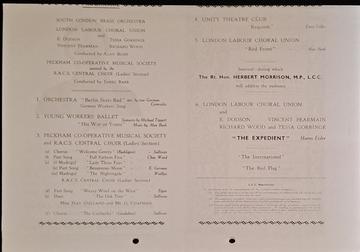We might think first of all of Benjamin Britten’s famous postwar visits to Soviet Union and friendships with Dmitri Shostakovich and Mstislav Rostropovich when we think of British-Soviet musical encounters. Yet in the interwar period, Soviet music and theatre was already inspiring songs, concerts and pageants in Britain. The key figure in this activity was the composer Alan Bush (1900-35), who got a taste for radical music and communism while studying in Berlin in the last years of the Weimar Republic. Back in England, armed with a collection of working-class choirs and a set of ideas about how to overthrow musical traditions, he began to experiment.
In our November 2023 workshop ‘Radical Music in Interwar Britain’, I and local radical choir the Sea Green Singers recreated some of these experiments. Bush’s first principle, borrowed from Soviet theatre and concerts in factories, was that the traditional concert with tailcoats, professional musicians, and a reverently silent audience was a thing of the past. The old style of concert should be mocked and alternatives presented which used working-class amateur performers and which blended music, theatre, dance, and political speeches (EXAMPLE programme).

We followed Bush’s example, planting a heckler to interrupt a performance of ‘After the Ball’, before launching into one of his political numbers. Political and – even more – topical numbers spoke to Bush’s second principle. A new political and social epoch could only be achieved through new music, and music that spoke to the crises of the 1930s. The composer was one of the authors of the famous Left Song Book (1938), featuring songs on themes of the age such as the famous ‘Hunger marches’ of the 1930s. As a third principle, Bush recognised that it was crucial not only to consider what workers sang, but how they sang it. Operatic or choral beauty of tone was replaced by an injunction that words should be ‘hurled’ at the audience in a form of Sprechgesang that could be accompanied by marching or even stamping, as in the composer’s own ‘Song of the Hunger Marchers’ (1934) (detail from image of ‘Song of the Hunger Marchers’). As a final point, Bush’s new music had to collapse the boundaries between musical performers and audience, and he wrote a song ‘Question and Answer’ (1931), in which the choir pose questions like ‘Are the workers badly fed?’ and the audience get the message by singing back the answer.
Our recreation of these experiments in a new workshop showed surprising success in achieving a suitably militant singing tone and encouraging the audience to sing, as one choir member also led a round of Extinction Rebellion’s ‘Cut out Carbon’ to the tune of ‘Frère Jacques’. While Bush’s working-class musical culture was certainly a product of its time, it had an obvious legacy in the ongoing world of political song.
Follow the link to the relevant event.
Britain and the Soviet Union: Early Cultural Encounters Network, TORCH Networks